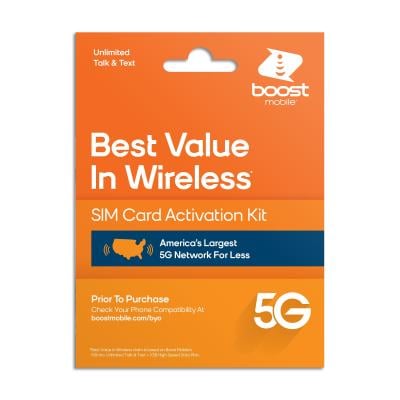7-Eleven has long been a Boost Mobile partner from a prepaid top-up perspective, where customers can walk into a store and buy top-up cards and pay bills.
But now Boost is eyeing 7-Eleven stores for their ability to acquire new customers. Starting this month, new and existing Boost Mobile customers can purchase SIM kits to start service, as well as Re-Boost cards to stay connected.
“We are expanding this relationship to focus more on acquisitions,” said Rob Hussa, SVP of Boost Mobile at Dish Wireless. “We do a lot of transactions with 7-Eleven currently for top-up.”
It’s a full rollout, starting today, to thousands of 7-Eleven stores – at least 7,500 and potentially as many as 8,500. It will probably take four to six weeks to cover all the doors, he said.

The SIM kits are aimed at folks who bring their own device, or BYOD. The package, which is basically a small sleeve that fits on a peg, includes clear instructions about how to activate it or initiate a port, he said.
It’s similar to what Boost offers at Walmart, Target and Best Buy, although the selection is wider in those stores. SIM kits and Re-Boost cards also are available at CVS, Walgreens and Kroger stores nationwide.
7-Eleven’s history with wireless
7-Eleven has an interesting history in the wireless market, said Jeff Moore, principal at Wave7 Research, which tracks wireless sales at retail locations across the U.S.
For example, there’s 7-Eleven SpeakOut Wireless, an MVNO brand for prepaid wireless that was launched by the convenience store chain in the U.S. in April 2003. It later expanded to Canada, where it’s still offered today. In the U.S., however, it went out of business, ceasing operations in 2010.
Other than that, the state of play at 7-Eleven mostly has been as a place that sells top-up cards and not much more than that, Moore said. Wave7 hasn’t even been including 7-Eleven in its wireless retail store reports.
Generally speaking, the track record of 7-Eleven in wireless has been poor, he said. “For wireless sales, you kind of need to have people who really understand wireless,” due to the complexities of activation, networks and so forth.
“If they can somehow make this very user friendly, then maybe this can be an additional path for distribution for Boost Mobile,” but based on 7-Eleven’s history, “I’m a skeptic,” Moore said.
Good fit for Boost
Hussa said they're trying to make the SIM kit an easy way for someone who wants to get started on Boost Mobile.
Boost customers tend to use cash to pay their bills, so 7-Eleven is a good fit in that respect, as well as being in so many neighborhoods.
“It’s a great way for us to expand our distribution footprint from an acquisition standpoint,” he said.
What’s next? “Always looking for great partners to expand the scope of where we can go with the Boost Mobile brand,” whether it be indirect locations specific for Boost or expanding its presence within big box retailers, Hussa said.
“We’ll continue to look for the right strategic partners to grow our distribution profitably,” he said.